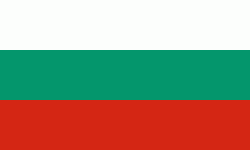Knezha
Knezha (Кнежа, ) is a town in Pleven Province, Northern Bulgaria. It is the administrative center of the homonymous Knezha Municipality.
The town's name is most probably derived from the Slavic word knyaz ("prince, duke"), most likely after a local ruler that defended the population in the area during the Ottoman rule of Bulgaria. Knezha is the third-largest town in the province, after Pleven and Cherven Bryag, and is the administrative centre of a municipality. The town was located in Vratsa province until 2001, when a boundary change shifted the town into Pleven province.
A local landmark is the 17 m steel Christian cross constructed on a hill overlooking the town. The cross' construction was financed entirely by donations. It has luminescent lighting bodies attached to it and is illuminated in blue at night. The cross is similar to the larger Millennium Cross above Skopje. Knezha also has a historical museum and an amateur theatre performing in the local community centre (chitalishte). The Institute on Maize of the Agricultural Academy is based in Knezha; it was founded in 1924.
The town's name is most probably derived from the Slavic word knyaz ("prince, duke"), most likely after a local ruler that defended the population in the area during the Ottoman rule of Bulgaria. Knezha is the third-largest town in the province, after Pleven and Cherven Bryag, and is the administrative centre of a municipality. The town was located in Vratsa province until 2001, when a boundary change shifted the town into Pleven province.
A local landmark is the 17 m steel Christian cross constructed on a hill overlooking the town. The cross' construction was financed entirely by donations. It has luminescent lighting bodies attached to it and is illuminated in blue at night. The cross is similar to the larger Millennium Cross above Skopje. Knezha also has a historical museum and an amateur theatre performing in the local community centre (chitalishte). The Institute on Maize of the Agricultural Academy is based in Knezha; it was founded in 1924.
Map - Knezha
Map
Country - Bulgaria
 |
 |
| Flag of Bulgaria | |
One of the earliest societies in the lands of modern-day Bulgaria was the Neolithic Karanovo culture, which dates back to 6,500 BC. In the 6th to 3rd century BC the region was a battleground for ancient Thracians, Persians, Celts and Macedonians; stability came when the Roman Empire conquered the region in AD 45. After the Roman state splintered, tribal invasions in the region resumed. Around the 6th century, these territories were settled by the early Slavs. The Bulgars, led by Asparuh, attacked from the lands of Old Great Bulgaria and permanently invaded the Balkans in the late 7th century. They established the First Bulgarian Empire, victoriously recognised by treaty in 681 AD by the Eastern Roman Empire. It dominated most of the Balkans and significantly influenced Slavic cultures by developing the Cyrillic script. The First Bulgarian Empire lasted until the early 11th century, when Byzantine emperor Basil II conquered and dismantled it. A successful Bulgarian revolt in 1185 established a Second Bulgarian Empire, which reached its apex under Ivan Asen II (1218–1241). After numerous exhausting wars and feudal strife, the empire disintegrated and in 1396 fell under Ottoman rule for nearly five centuries.
Currency / Language
| ISO | Currency | Symbol | Significant figures |
|---|---|---|---|
| BGN | Bulgarian lev | лв | 2 |
| ISO | Language |
|---|---|
| BG | Bulgarian language |
| TR | Turkish language |















